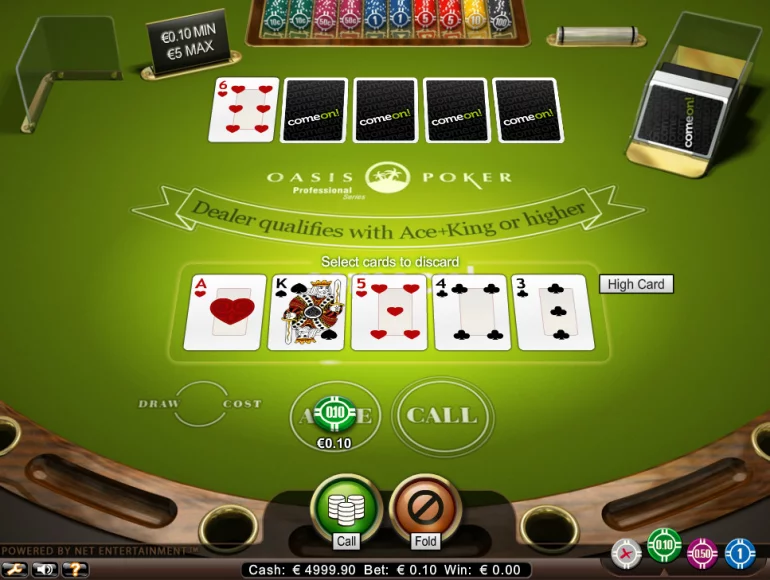Oasis Poker is a captivating casino card game, a variant of Caribbean Stud Poker, where players compete against the dealer rather than each other. The core objective is to form a five-card poker hand that outranks the dealer's hand.
Understanding Oasis Poker Fundamentals
What sets Oasis Poker apart is the unique option to exchange one or more cards, offering a layer of decision-making that can turn seemingly difficult situations into profitable opportunities. However, this flexibility also introduces complexity, requiring players to make informed choices to maximize their chances of success.

The Ante and Initial Deal
Every hand in Oasis Poker begins with an ante bet. Following this, both the player and the dealer receive five cards. Crucially, only one of the dealer's cards is revealed face-up, providing a vital piece of information for the player's subsequent decisions. This single exposed card is often the cornerstone of strategic choices, especially when facing complicated hand compositions.
Strategic Decisions: Call, Fold, or Exchange
After the initial deal and viewing the dealer's upcard, players are presented with several choices. These decisions are where the game's depth truly emerges, particularly when your hand is neither exceptionally strong nor clearly weak. Making the optimal choice in these ambiguous situations is key to long-term profitability.
When to Fold in Oasis Poker
Folding is often the most prudent action in Oasis Poker when your hand holds little to no potential. It saves you from losing additional chips on a hand with very low odds of winning. Consider folding in these scenarios:
- You have a very weak hand with no pair and no realistic draws (e.g., a high card that isn't an Ace or King, and no flush or straight possibilities).
- The dealer's upcard suggests they are likely to have a strong qualifying hand, and your hand is marginal.
- You have a small pair, but the dealer's upcard is an Ace or King, making it less likely your pair will hold up.
The Card Exchange Option
One of the defining features of Oasis Poker is the ability to exchange cards. This comes at a cost, usually equal to the ante bet per card exchanged. This option is powerful for improving marginal hands or completing draws. However, it's vital to use it judiciously to avoid unnecessary expenses.
Considerations for Card Exchange:
- Four to a Flush or Straight: If you have four cards to a flush or an open-ended straight, exchanging one card can significantly increase your hand's value. The odds of completing these draws are often favorable enough to justify the cost.
- Improving a High Pair: Sometimes, exchanging a kicker with a high pair (e.g., Jacks or Queens with a low kicker) can improve your hand's overall strength if you draw a better card.
- Dealer's Upcard Influence: The dealer's visible card plays a role. If you have a decent hand but need a slight improvement to beat a potentially strong dealer hand, an exchange might be worthwhile.
Navigating Dealer Qualification Scenarios
A central element of Oasis Poker strategy revolves around the dealer's hand qualification. The dealer must have at least an Ace-King or better to qualify. If the dealer does not qualify, you receive an immediate payout equal to your ante bet, and your main bet is returned.
Dealer Qualifies: Comparing Hands
If the dealer qualifies, your hand is compared to theirs. The higher poker hand wins. This is where the strength of your hand and your earlier decisions on calling or exchanging cards come into full effect. If you have a strong hand (e.g., Two Pair, Three of a Kind, Straight, Flush, Full House), you want the dealer to qualify so you can win a payout on your bet.
Dealer Doesn't Qualify: Strategic Implications
When the dealer does not qualify, it can present an interesting decision point. Some variations of Oasis Poker allow players to 'buy' a new card for the dealer's non-qualifying hand at the cost of the ante. This is a strategic move, often considered when you have a very strong hand and want to ensure a payout.
When to Consider Buying a Dealer Card:
- You hold a premium hand like a Straight, Flush, Full House, or Four of a Kind.
- The dealer's upcard is very low, making their initial non-qualification highly probable.
- You want to maximize your winnings from a strong hand, even at the cost of an additional ante.
Advanced Strategies for Tough Spots
Mastering Oasis Poker means understanding how to play hands that are not immediately obvious. These "tough spots" often involve balancing the risk of an exchange or call against the potential reward.
Playing Marginal Pairs
Hands with low to medium pairs (e.g., 6s, 7s, 8s) can be tricky. If the dealer's upcard is higher than your pair, you are often in a vulnerable position. Consider the following:
- If you have a small pair and the dealer shows an Ace or King, folding might be the best option.
- If you have a medium pair and the dealer's upcard is low, you might call, but be prepared for a potential higher pair or draw from the dealer.
Dealing with Ace-King Hands
An Ace-King hand (A-K) is strong, but it's important to remember it's still just a high card hand unless it pairs up or forms part of a straight or flush. With A-K, your decision often hinges on the dealer's upcard:
- If the dealer has a low card, your A-K is a strong contender.
- If the dealer's upcard is also an Ace or King, the hand becomes much more challenging, and folding might be considered if your kicker is weak.
Optimizing Your Oasis Poker Play
Consistent success in Oasis Poker stems from a disciplined approach and an understanding of probability. While luck plays a role, making informed decisions in complex situations significantly enhances your long-term results.
Focus on the dealer's upcard, evaluate the potential of your hand, and make informed decisions about folding, calling, or exchanging cards.
Practice and observation will sharpen your instincts, allowing you to navigate even the most challenging hands confidently.





































